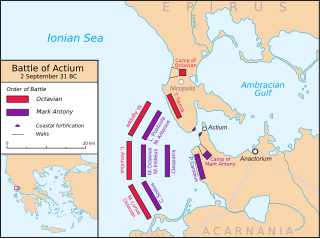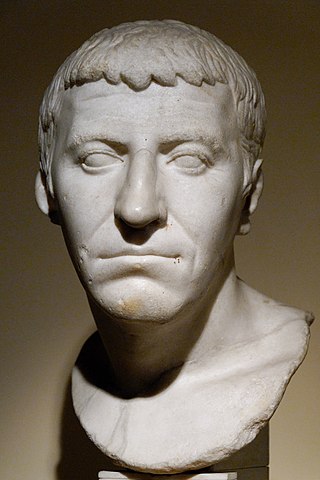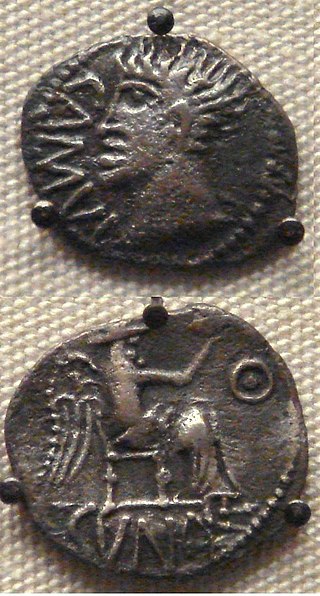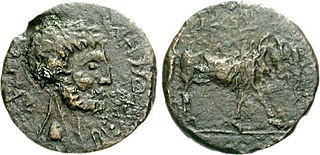Related Research Articles

Actium or Aktion was a town on a promontory in ancient Acarnania at the entrance of the Ambraciot Gulf, off which Octavian gained his celebrated victory, the Battle of Actium, over Antony and Cleopatra, on September 2, 31 BCE.

Gaius Suetonius Tranquillus, commonly referred to as Suetonius, was a Roman historian who wrote during the early Imperial era of the Roman Empire. His most important surviving work is a set of biographies of 12 successive Roman rulers from Julius Caesar to Domitian, properly titled De vita Caesarum. Other works by Suetonius concerned the daily life of Rome, politics, oratory, and the lives of famous writers, including poets, historians, and grammarians. A few of these books have partially survived, but many have been lost.

Gaius Cassius Longinus was a Roman senator and general best known as a leading instigator of the plot to assassinate Julius Caesar on 15 March 44 BC. He was the brother-in-law of Brutus, another leader of the conspiracy. He commanded troops with Brutus during the Battle of Philippi against the combined forces of Mark Antony and Octavian, Caesar's former supporters, and committed suicide after being defeated by Mark Antony.
Joannes Xiphilinus, epitomator of Dio Cassius, lived at Constantinople during the latter half of the 11th century AD. He was a monk and the nephew of Patriarch John VIII of Constantinople, a well-known preacher.

The decemviri or decemvirs refer to official 10-man commissions established by the Roman Republic.

Lucius Antonius was the younger brother and supporter of Mark Antony, a Roman politician. He was nicknamed Pietas as a young man.

The vigintisexviri were a college (collegium) of minor magistrates in the Roman Republic. The college consisted of six boards:

Cunobeline was a king in pre-Roman Britain from about AD 9 until about AD 40. He is mentioned in passing by the classical historians Suetonius and Dio Cassius, and many coins bearing his inscription have been found. He controlled a substantial portion of south-eastern Britain, including the territories of the Catuvellauni and the Trinovantes, and is called "King of the Britons" by Suetonius. He appears to have been recognized by Roman emperor Augustus as a client king, as testified by the use of the Latin title Rex on his coins. Cunobeline appears in British legend as Cynfelyn (Welsh), Kymbelinus or Cymbeline, as in the play by William Shakespeare.

Bocchus II was a king of Mauretania in the 1st century BC. He was the son of Mastanesosus, who died in 49 BC, upon which Bocchus inherited the throne.
Gaius Helvius Cinna was an influential neoteric poet of the late Roman Republic, a little older than the generation of Catullus and Calvus. He was lynched at the funeral of Julius Caesar after being mistaken for an unrelated Cornelius Cinna who had spoken out in support of the dictator's assassins.

Hiempsal II was a king of Numidia. He was the son of Gauda, half-brother of Jugurtha, and was the father of Juba I.
Lucius Aurelius Cotta was a Roman politician from an old noble family who held the offices of praetor, consul and censor. Both his father and grandfather of the same name had been consuls, and his two brothers, Gaius Aurelius Cotta and Marcus Aurelius Cotta, preceded him as consul in 75 and 74 BC respectively. His sister, Aurelia, was married to Gaius Julius Caesar, brother-in-law to Gaius Marius and possibly Lucius Cornelius Sulla, and they were the parents of the famous general and eventual dictator, Gaius Julius Caesar.

Gaius Cornelius Gallus was a Roman poet, orator, politician and military commander, at one time appointed by the Emperor Augustus as prefect of Egypt. Although only nine lines of his poetry are extant today, he was considered by Ovid as one of the major Latin poets of the 1st century BC.
Acta Senatus, or Commentarii Senatus, were minutes of the discussions and decisions of the Roman Senate. Before the first consulship of Julius Caesar, minutes of the proceedings of the Senate were written and occasionally published, but unofficially; Caesar first ordered them to be recorded and issued authoritatively in the Acta Diurna. The keeping of them was continued by Augustus, but their publication was forbidden. A young senator was chosen to draw up these acta, which were kept in the imperial archives and public libraries. Special permission from the city prefect was necessary in order to examine them.

The gens Aquillia or Aquilia was a plebeian family of great antiquity at ancient Rome. Two of the Aquillii are mentioned among the Roman nobles who conspired to bring back the Tarquins, and a member of the house, Gaius Aquillius Tuscus, was consul in 487 BC.
Itius Portus or Portus Itius was the ancient Roman name for a sea port on the English Channel in what is now Nord-Pas-de-Calais, France, though its precise location is unknown. The main candidates have been Saint-Omer (Sithiu), Wissant and Boulogne, but a silted-up lagoon on the Flanders shore behind Calais now seems most likely.
Gaius Rabirius was a Roman senator who was involved in the death of Lucius Appuleius Saturninus in 100 BC. Titus Labienus, a Tribune of the Plebs whose uncle had lost his life among the followers of Saturninus on that occasion, was urged by fellow Senator and patron Julius Caesar to accuse Rabirius of participating in the murder. Caesar's real objective was to warn the Senate against interference by force with popular movements, to uphold the sovereignty of the people and the inviolability of the person of the tribunes, at the time of the conspiracy of Lucius Sergius Catilina. The obsolete accusation of perduellio was revived, and the case was heard before Caesar and his cousin Lucius Julius Caesar as commissioners specially appointed.
The centumviral court (centumviri) was the chancery court of ancient Rome. It was a court of justice dealing with private law.
Quintus Lutatius Catulus Capitolinus was a politician in the late Roman Republic. His father was the like-named Quintus Lutatius Catulus, consul in 102 BC. He gained the agnomen "Capitolinus" for his defense of the capital in 77 BC against Lepidus.
Marcus Valerius Messalla Rufus, was a Roman senator who was elected consul for 53 BC.
References
- 1 2 Clay, Agnes Muriel (1911). . In Chisholm, Hugh (ed.). Encyclopædia Britannica . Vol. 7 (11th ed.). Cambridge University Press. p. 912; see para 2.
II. The judicial board of decemvirs (stlitibus judicandis) formed a civil court of ancient origin concerned mainly with questions bearing on the status of individuals.
- ↑ Colognesi, Law and Power in the Making of the Roman Commonwealth.
- ↑ Suetonius, "The Life of Augustus", 36.